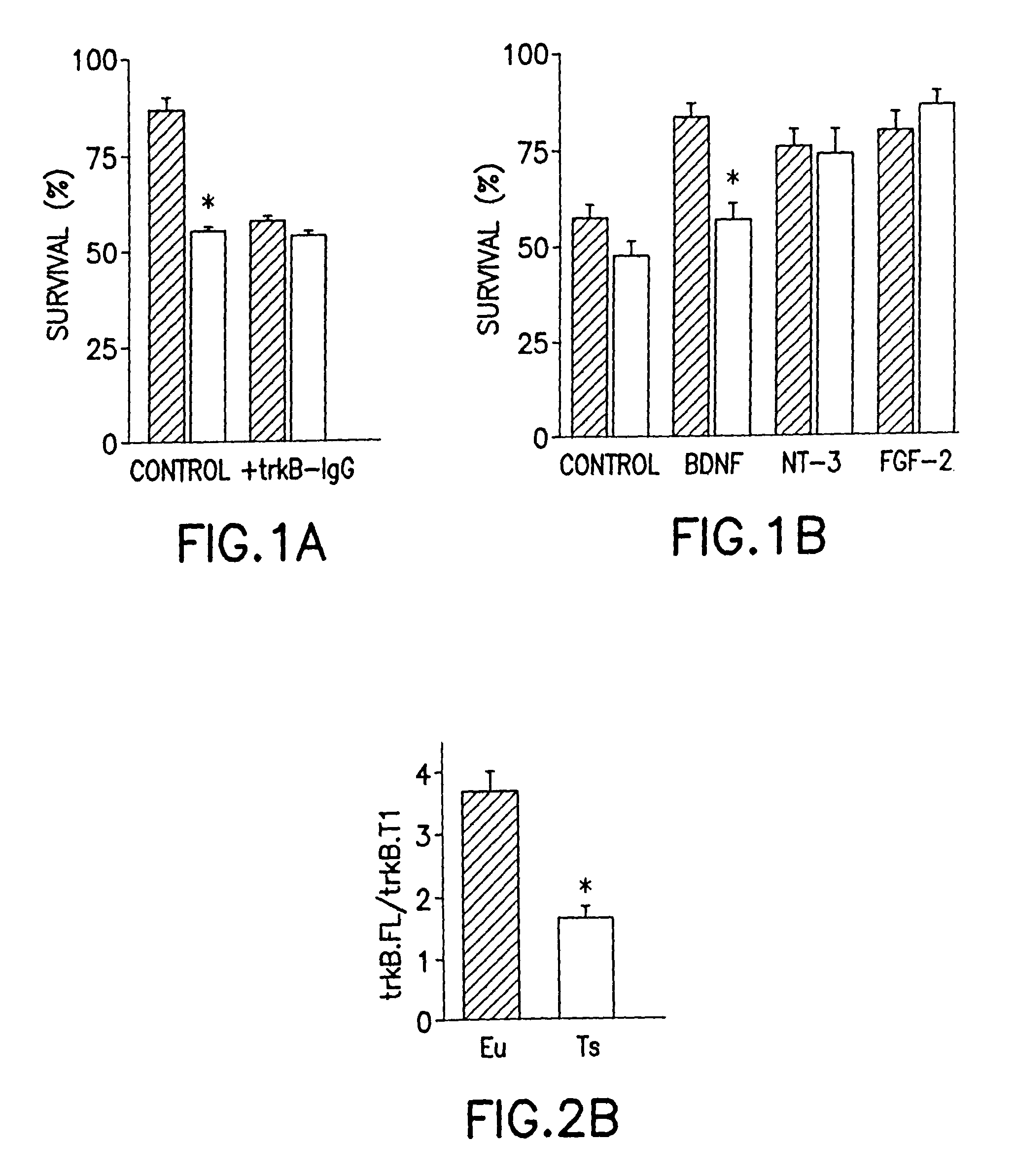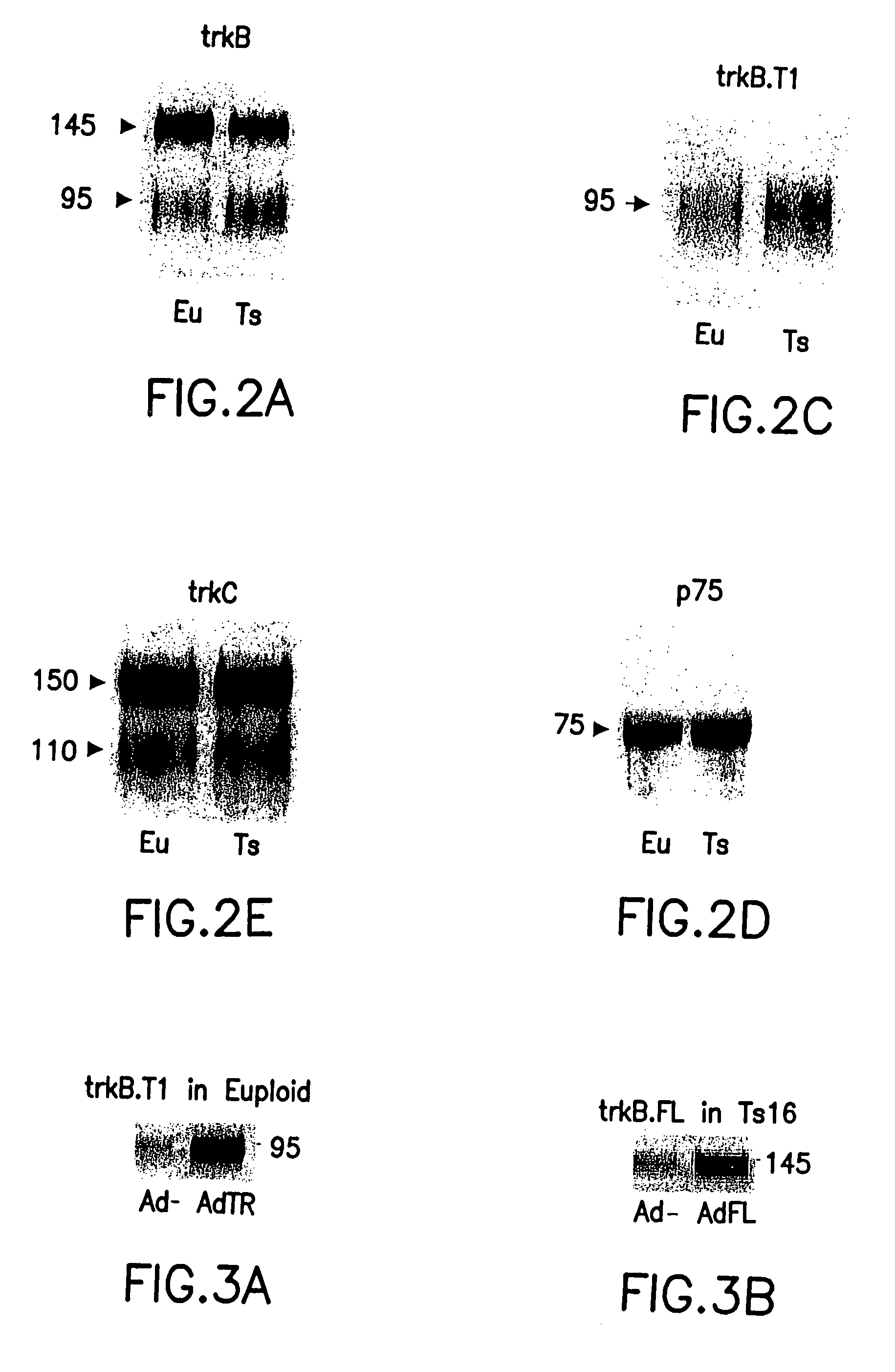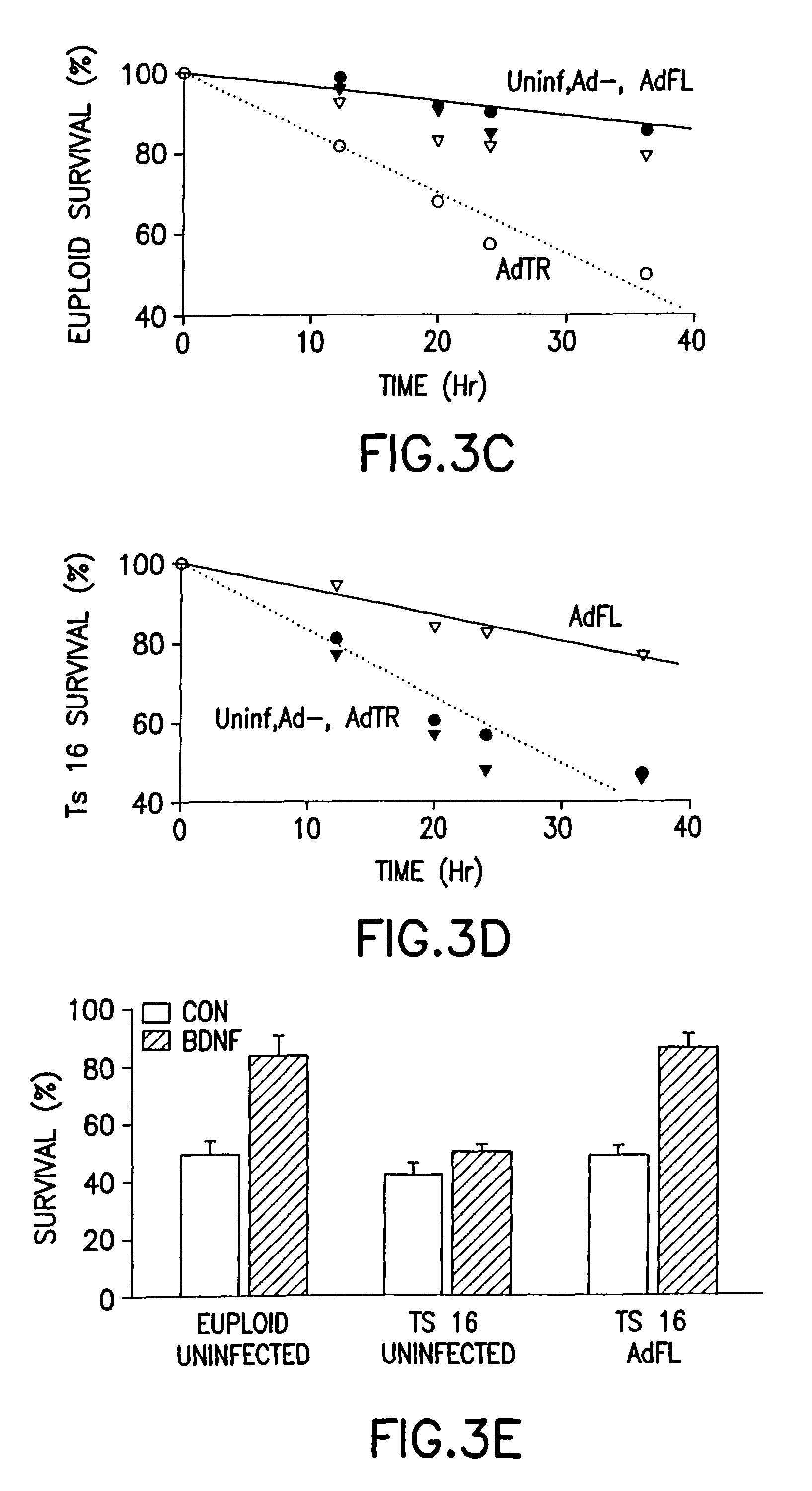[0009]It is an object of this invention to treat or prevent neuro-degenerative disorders or neuro-developmental disorders by increasing the amount of full-length TrkB polypeptide in neurons. It is a further object of this invention to treat or prevent Alzheimer's disease, Parkinson's disease, Huntington's disease,
amyotrophic lateral sclerosis (Lou Gehrig's disease), the adverse neurologic complications of
Down syndrome, diabetic
peripheral neuropathy, other types of
peripheral neuropathy, and
neuron death resulting from injury such as
stroke, cerebral
ischemia, or chemical and / or
physical trauma to the central or
peripheral nervous system by increasing the amount of full-length TrkB polypeptide in neurons. It is a further object of this invention to treat or prevent Alzheimer's disease, Parkinson's disease, Huntington's disease,
amyotrophic lateral sclerosis (Lou Gehrig's disease), the adverse neurologic complications of
Down syndrome, diabetic
peripheral neuropathy, other types of
peripheral neuropathy, and
neuron death resulting from injury such as
stroke, cerebral
ischemia, or chemical and / or
physical trauma to the central or
peripheral nervous system by increasing the amount of full-length TrkB polypeptide in neurons and by administering neurotrophins. It is another object of this invention that, in order to increase the amount of full-length TrkB polypeptide in neurons, one can administer nucleic acids which
encode for full-length TrkB polypeptide or that one can administer full-length TrkB polypeptides.
[0010]It is an object of this invention to treat or prevent neuro-degenerative disorders or neuro-developmental disorders by decreasing the amount of truncated TrkB polypeptides in neurons. It is a further object of this invention to treat or prevent Alzheimer's disease, Parkinson's disease, Huntington's disease, amyotrophic lateral sclerosis (Lou Gehrig's disease), the adverse neurologic complications of Down syndrome, diabetic
peripheral neuropathy, other types of peripheral neuropathy, and
neuron death resulting from injury such as stroke, cerebral
ischemia, or chemical and / or
physical trauma to the central or
peripheral nervous system by decreasing the amount of truncated TrkB polypeptides in neurons. It is also an object of this invention to treat or prevent Alzheimer's disease, Parkinson's disease, Huntington's disease, amyotrophic lateral sclerosis (Lou Gehrig's disease), the adverse neurologic complications of Down syndrome, diabetic peripheral neuropathy, other types of peripheral neuropathy, and neuron death resulting from injury such as stroke, cerebral ischemia, or chemical and / or physical trauma to the central or
peripheral nervous system by decreasing the amount of truncated TrkB polypeptides in neurons and by administering neurotrophins. It is a further object of this invention that one can decrease the amount of truncated TrkB polypeptides in neurons by administering nucleic acids which
encode anti-sense
RNA specific for truncated TrkB polypeptides or by administering nucleic acids which
encode for
double stranded RNA specific for truncated TrkB polypeptides.
[0011]It is an object of this invention to treat or prevent neuro-degenerative disorders or neuro-developmental disorders by increasing the ratio of the amount of full-length TrkB polypeptide to the amount of truncated TrkB polypeptides. It is a further object of this invention to treat or prevent Alzheimer's disease, Parkinson's disease, Huntington's disease, amyotrophic lateral sclerosis (Lou Gehrig's disease), the adverse neurologic complications of Down syndrome, diabetic peripheral neuropathy, other types of peripheral neuropathy, and neuron death resulting from injury such as stroke, cerebral ischemia, or chemical and / or physical trauma to the central or peripheral
nervous system by increasing the ratio of the amount of full-length TrkB polypeptide to the amount of truncated TrkB polypeptides. It is also an object of this invention to treat or prevent Alzheimer's disease, Parkinson's disease, Huntington's disease, amyotrophic lateral sclerosis (Lou Gehrig's disease), the adverse neurologic complications of Down syndrome, diabetic peripheral neuropathy, other types of peripheral neuropathy, and neuron death resulting from injury such as stroke, cerebral ischemia, or chemical and / or physical trauma to the central or peripheral
nervous system by increasing the ratio of the amount of full-length TrkB polypeptide to the amount of truncated TrkB polypeptides in neurons and by administering neurotrophins. It is a further object of this invention that one can increase the ratio of the amount of full-length TrkB polypeptide to the amount of truncated TrkB polypeptides by administering nucleic acids or polypeptides which encode for full-length TrkB polypeptide or by administering nucleic acids which encode for anti-sense
RNA specific for truncated TrkB polypeptides or by administering nucleic acids which encode for
double stranded RNA specific for truncated TrkB polypeptides, or by administering a combination thereof.
[0012]It is an object of this invention to treat or prevent neuro-degenerative disorders or neuro-developmental disorders by increasing the amount of full-length TrkC polypeptide in neurons. It is a further object of this invention to treat or prevent Alzheimer's disease, Parkinson's disease, Huntington's disease, amyotrophic lateral sclerosis (Lou Gehrig's disease), the adverse neurologic complications of Down syndrome, diabetic peripheral neuropathy, other types of peripheral neuropathy, and neuron death resulting from injury such as stroke, cerebral ischemia, or chemical and / or physical trauma to the central or peripheral nervous
system by increasing the amount of full-length TrkC polypeptide in neurons. It is a further object of this invention to treat or prevent Alzheimer's disease, Parkinson's disease, Huntington's disease, amyotrophic lateral sclerosis (Lou Gehrig's disease), the adverse neurologic complications of Down syndrome, diabetic peripheral neuropathy, other types of peripheral neuropathy, and neuron death resulting from injury such as stroke, cerebral ischemia, or chemical and / or physical trauma to the central or peripheral nervous
system by increasing the amount of full-length TrkC polypeptide in neurons and by administering neurotrophins. It is another object of this invention that, in order to increase the amount of full-length TrkC polypeptide in neurons, one can administer nucleic acids which encode for full-length TrkB polypeptide or that one can administer full-length TrkC polypeptides.
[0013]It is an object of this invention to treat or prevent neuro-degenerative disorders or neuro-developmental disorders by decreasing the amount of truncated TrkC polypeptides in neurons. It is a further object of this invention to treat or prevent Alzheimer's disease, Parkinson's disease, Huntington's disease, amyotrophic lateral sclerosis (Lou Gehrig's disease), the adverse neurologic complications of Down syndrome, diabetic peripheral neuropathy, other types of peripheral neuropathy, and neuron death resulting from injury such as stroke, cerebral ischemia, or chemical and / or physical trauma to the central or peripheral nervous
system by decreasing the amount of truncated TrkC polypeptides in neurons. It is also an object of this invention to treat or prevent Alzheimer's disease, Parkinson's disease, Huntington's disease, amyotrophic lateral sclerosis (Lou Gehrig's disease), the adverse neurologic complications of Down syndrome, diabetic peripheral neuropathy, other types of peripheral neuropathy, and neuron death resulting from injury such as stroke, cerebral ischemia, or chemical and / or physical trauma to the central or peripheral nervous system by decreasing the amount of truncated TrkC polypeptides in neurons and by administering neurotrophins. It is a further object of this invention that one can decrease the amount of truncated TrkC polypeptides in neurons by administering nucleic acids which encode for anti-sense RNA specific for truncated TrkC polypeptides or by administering nucleic acids which encode for
double stranded RNA specific for truncated TrkC polypeptides.
[0014]It is an object of this invention to treat or prevent neuro-degenerative disorders or neuro-developmental disorders by increasing the ratio of the amount of full-length TrkC polypeptide to the amount of truncated TrkC polypeptides. It is a further object of this invention to treat or prevent Alzheimer's disease, Parkinson's disease, Huntington's disease, amyotrophic lateral sclerosis (Lou Gehrig's disease), the adverse neurologic complications of Down syndrome, diabetic peripheral neuropathy, other types of peripheral neuropathy, and neuron death resulting from injury such as stroke, cerebral ischemia, or chemical and / or physical trauma to the central or peripheral nervous system by increasing the ratio of the amount of full-length TrkC polypeptide to the amount of truncated TrkC polypeptides. It is a further object of this invention that one can increase the ratio of the amount of full-length TrkC polypeptide to the amount of truncated TrkC polypeptides by administering nucleic acids which encode for full-length TrkC polypeptide or by administering nucleic acids which encode for anti-sense RNA specific for truncated TrkC polypeptides or by administering nucleic acids which encode for
double stranded RNA specific for truncated TrkC polypeptides, or by administering a combination thereof.
 Login to View More
Login to View More 


